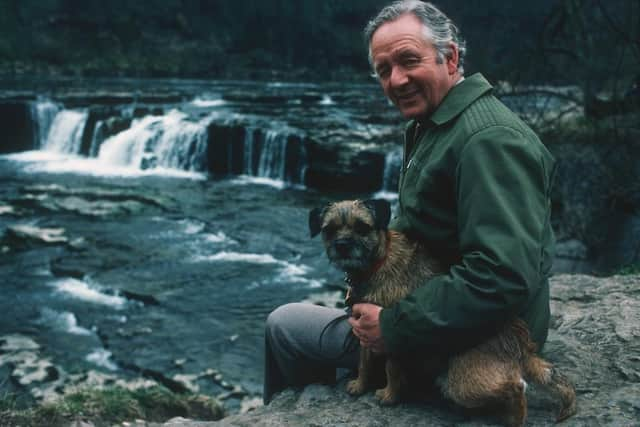All Creatures Great and Small original books: Who wrote the famous books that inspired the Yorkshire based BBC and Channel 5 series starring Nicholas Ralph, Samuel West and Rachel Shenton?
The original All Creatures Great and Small book was published in 1970 by a veterinary surgeon and author who worked in Yorkshire for nearly 50 years.
He has written a series of eight books between 1970 and 1977 set in the 1930s to 1950s Yorkshire Dales about veterinary practice, animals, and their owners, which began with If Only They Could Talk. Over the decades, the series of books has sold 60 million copies.
Advertisement
Hide AdAdvertisement
Hide AdThe franchise was so successful that they have been adapted into several TV shows and films of his books, including the 1975 film All Creatures Great and Small; a BBC television series of the same name, which ran 90 episodes; and a 2020 UK Channel 5 series, also of the same name.


Who is the author of All Creatures Great and Small?
James Alfred Wight, who had the nickname Alf for short, was born in Sunderland, County Durham.
The family moved to Glasgow when James was a child, and he enjoyed a childhood there until he left for Sunderland, then moved to Thirsk in 1940.
He had a ‘soft, lilting Scottish accent’ according to actor Christopher Timothy, who depicted James Herriot in the 1978 series.
Advertisement
Hide AdAdvertisement
Hide AdHe attended Yorker Primary School and Hillhead High School and when he was young in Glasgow, one of his favourite hobbies was walking with his dog, an Irish Setter, in the Scottish countryside and watching it play with his friends’ dogs.
He was inspired to pursue a career of treating sick animals when he read an article in Meccano Magazine about veterinary surgeons at the age of 12. Two years later he decided to become a vet after the principal at Glasgow Veterinary College gave a lecture at his high school.
Mr Wight took six years to complete the five-year programme at Glasgow Veterinary College and failed several of his classes on the first try (surgery, pathology, physiology, histology, animal husbandry). His setback was partly because of a recurring gastrointestinal problem, which required multiple operations. He graduated in December 1939.
His first job was based at a veterinary practice in Sunderland, working for JJ McDowall, in January 1940.
Advertisement
Hide AdAdvertisement
Hide AdMr Wight grew interested in working at a rural practice and accepted a position at 23 Kirkgate in Thirsk, in July of that year, near the Yorkshire Dales and the North York Moors.
The practice owner, Donald Sinclair, had enlisted in the Royal Air Force (RAF) and soon left for training; he gave Mr Wight all the practice’s income in return for looking after it during his absence.
After Mr Sinclair was discharged from the RAF four months later, he asked Mr Wight to stay permanently with the practice, offering him a salaried position, which he accepted.
Mr Wight married Joan Catherine Anderson Danbury in November 5, 1941 at St Mary’s Church, Thirsk.
Advertisement
Hide AdAdvertisement
Hide AdWhen they returned to Thirsk, he carried on TB testing of cows in Wensleydale and the top floor of 23 Kirkgate became Joan and Alf’s first home.
The couple had two children: James Alexander (born in February 1943), who also became a veterinarian and eventually took over his father’s practice, and Rosemary (born in May 1947), who became a general practitioner.
Mr Wight then enlisted in the RAF in November 1942 and did well in his training and was one of the first in his flight to fly solo. Following a surgery on an anal fistula in July 1943, he was declared unfit to fly combat aircraft and was discharged as a leading aircraftman the following November.
He joined his wife at her parents’ house, where she had lived since he left Thirsk. They lived there until the summer of 1945, when they moved back to 23 Kirkgate after Mr Sinclair and his wife moved to a house of their own.
Advertisement
Hide AdAdvertisement
Hide AdIn 1953, the family moved to a house on Topcliffe Road, Thirsk. Wanting more privacy following the huge success of All Creatures Great and Small, Mr Wight and his wife moved again in 1977 to the smaller village of Thirlby. He lived there until his death in 1995.
He became a full partner in the Thirsk practice in 1949 and retired from full-time work in 1980 but continued to work part-time. He fully retired in 1989.
Mr Wight had been diagnosed with prostate cancer in 1991 and was treated at the Friarage Hospital in Northallerton. He died in February 1995 at home at the age of 78, leaving an estate valued at £5,425,873 (equivalent to £11,096,613 in 2021).
In his will, his share of the practice was passed to his son and his remains were cremated and scattered on Sutton Bank. His wife’s health deteriorated after his death and she died in July 1999.
Comment Guidelines
National World encourages reader discussion on our stories. User feedback, insights and back-and-forth exchanges add a rich layer of context to reporting. Please review our Community Guidelines before commenting.
